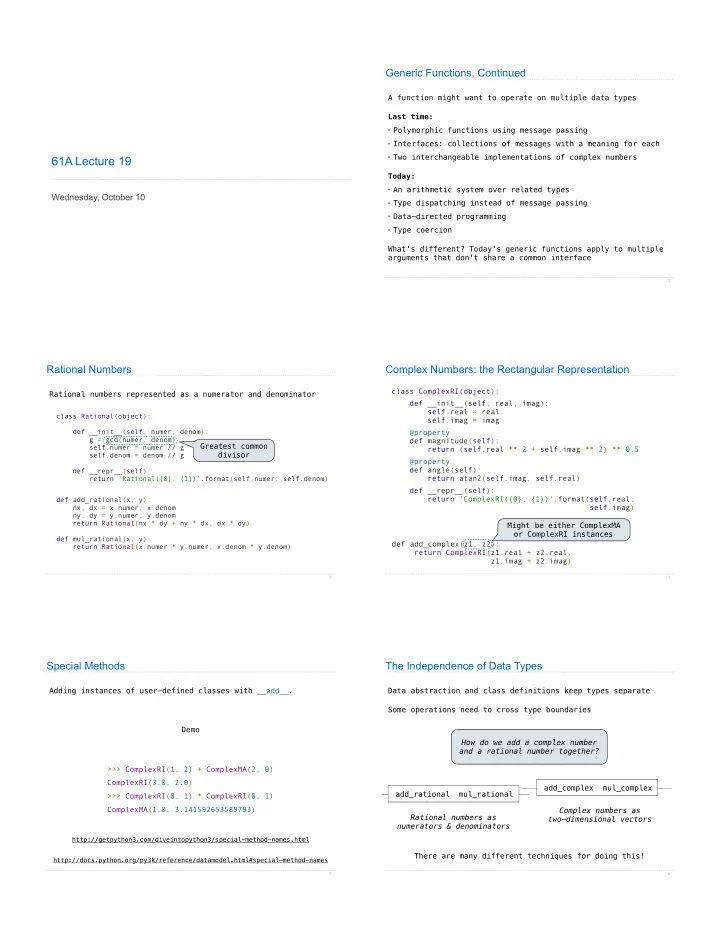

Generic Functions, Continued A function might want to operate on multiple data types Last time: • Polymorphic functions using message passing • Interfaces: collections of messages with a meaning for each • Two interchangeable implementations of complex numbers 61A Lecture 19 Today: • An arithmetic system over related types Wednesday, October 10 • Type dispatching instead of message passing • Data-directed programming • Type coercion What's different? Today's generic functions apply to multiple arguments that don't share a common interface 2 Rational Numbers Complex Numbers: the Rectangular Representation class ComplexRI(object): Rational numbers represented as a numerator and denominator def __init__(self, real, imag): self.real = real class Rational(object): self.imag = imag def __init__(self, numer, denom): @property g = gcd(numer, denom) def magnitude(self): Greatest common self.numer = numer // g return (self.real ** 2 + self.imag ** 2) ** 0.5 divisor self.denom = denom // g @property def angle(self): def __repr__(self): return atan2(self.imag, self.real) return 'Rational({0}, {1})'.format(self.numer, self.denom) def __repr__(self): return 'ComplexRI({0}, {1})'.format(self.real, def add_rational(x, y): self.imag) nx, dx = x.numer, x.denom ny, dy = y.numer, y.denom return Rational(nx * dy + ny * dx, dx * dy) Might be either ComplexMA or ComplexRI instances def mul_rational(x, y): def add_complex(z1, z2): return Rational(x.numer * y.numer, x.denom * y.denom) return ComplexRI(z1.real + z2.real, z1.imag + z2.imag) 3 4 Special Methods The Independence of Data Types Adding instances of user-defined classes with __add__ . Data abstraction and class definitions keep types separate Some operations need to cross type boundaries Demo How do we add a complex number and a rational number together? >>> ComplexRI(1, 2) + ComplexMA(2, 0) ComplexRI(3.0, 2.0) add_complex mul_complex add_rational mul_rational >>> ComplexRI(0, 1) * ComplexRI(0, 1) ComplexMA(1.0, 3.141592653589793) Complex numbers as Rational numbers as two-dimensional vectors numerators & denominators http://getpython3.com/diveintopython3/special-method-names.html There are many different techniques for doing this! http://docs.python.org/py3k/reference/datamodel.html#special-method-names 5 6
Type Dispatching Tag-Based Type Dispatching Define a different function for each possible combination of Idea : Use dictionaries to dispatch on type types for which an operation (e.g., addition) is valid def iscomplex(z): def type_tag(x): return type(z) in (ComplexRI, ComplexMA) return type_tag.tags[type(x)] Declares that ComplexRI def isrational(z): type_tag.tags = {ComplexRI: 'com', and ComplexMA should be Converted to a return type(z) is Rational ComplexMA: 'com', treated uniformly real number (float) Rational: 'rat'} def add_complex_and_rational(z, r): return ComplexRI(z.real + r.numer/r.denom, z.imag) def add(z1, z2): types = (type_tag(z1), type_tag(z2)) def add_by_type_dispatching(z1, z2): return add.implementations[types](z1, z2) """Add z1 and z2, which may be complex or rational.""" if iscomplex(z1) and iscomplex(z2): add.implementations = {} return add_complex(z1, z2) add.implementations[('com', 'com')] = add_complex elif iscomplex(z1) and isrational(z2): add.implementations[('rat', 'rat')] = add_rational return add_complex_and_rational(z1, z2) add.implementations[('com', 'rat')] = add_complex_and_rational elif isrational(z1) and iscomplex(z2): add.implementations[('rat', 'com')] = add_rational_and_complex return add_complex_and_rational(z2, z1) else: lambda r, z: add_complex_and_rational(z, r) add_rational(z1, z2) Demo 7 8 Type Dispatching Analysis Type Dispatching Analysis Minimal violation of abstraction barriers: we define cross- Minimal violation of abstraction barriers: we define cross- type functions as necessary, but use abstract data types type functions as necessary, but use abstract data types Extensible: Any new numeric type can "install" itself into the Extensible: Any new numeric type can "install" itself into the existing system by adding new entries to various dictionaries existing system by adding new entries to various dictionaries Arg 1 Arg 2 Add Multiply def add(z1, z2): Type Dispatching types = (type_tag(z1), type_tag(z2)) return add.implementations[types](z1, z2) Complex Complex Rational Rational Question: How many cross-type implementations are required to Complex Rational support m types and n operations? Rational Complex integer, rational, add, subtract, m · ( m − 1) · n real, complex multiply, divide Message Passing 4 · (4 − 1) · 4 = 48 9 10 Data-Directed Programming Coercion There's nothing addition-specific about add_by_type Idea : Some types can be converted into other types Idea : One dispatch function for (operator, types) pairs Takes advantage of structure in the type system def apply(operator_name, x, y): >>> def rational_to_complex(x): return ComplexRI(x.numer/x.denom, 0) tags = (type_tag(x), type_tag(y)) key = (operator_name, tags) return apply.implementations[key](x, y) >>> coercions = {('rat', 'com'): rational_to_complex} Question: Can any numeric type be coerced into any other? Demo Question: Have we been repeating ourselves with data-directed programming? 11 12
Applying Operators with Coercion Coercion Analysis 1. Attempt to coerce arguments into values of the same type Minimal violation of abstraction barriers: we define cross- type coercion as necessary, but use abstract data types 2. Apply type-specific (not cross-type) operations Requires that all types can be coerced into a common type def coerce_apply(operator_name, x, y): More sharing: All operators use the same coercion scheme tx, ty = type_tag(x), type_tag(y) if tx != ty: Arg 1 Arg 2 Add Multiply if (tx, ty) in coercions: Complex Complex tx, x = ty, coercions[(tx, ty)](x) Rational Rational Complex Rational elif (ty, tx) in coercions: Rational Complex ty, y = tx, coercions[(ty, tx)](y) else: return 'No coercion possible.' From To Coerce Type Add Multiply assert tx == ty Complex Rational Complex key = (operator_name, tx) Rational Complex Rational Demo return coerce_apply.implementations[key](x, y) 13 14
Recommend
More recommend